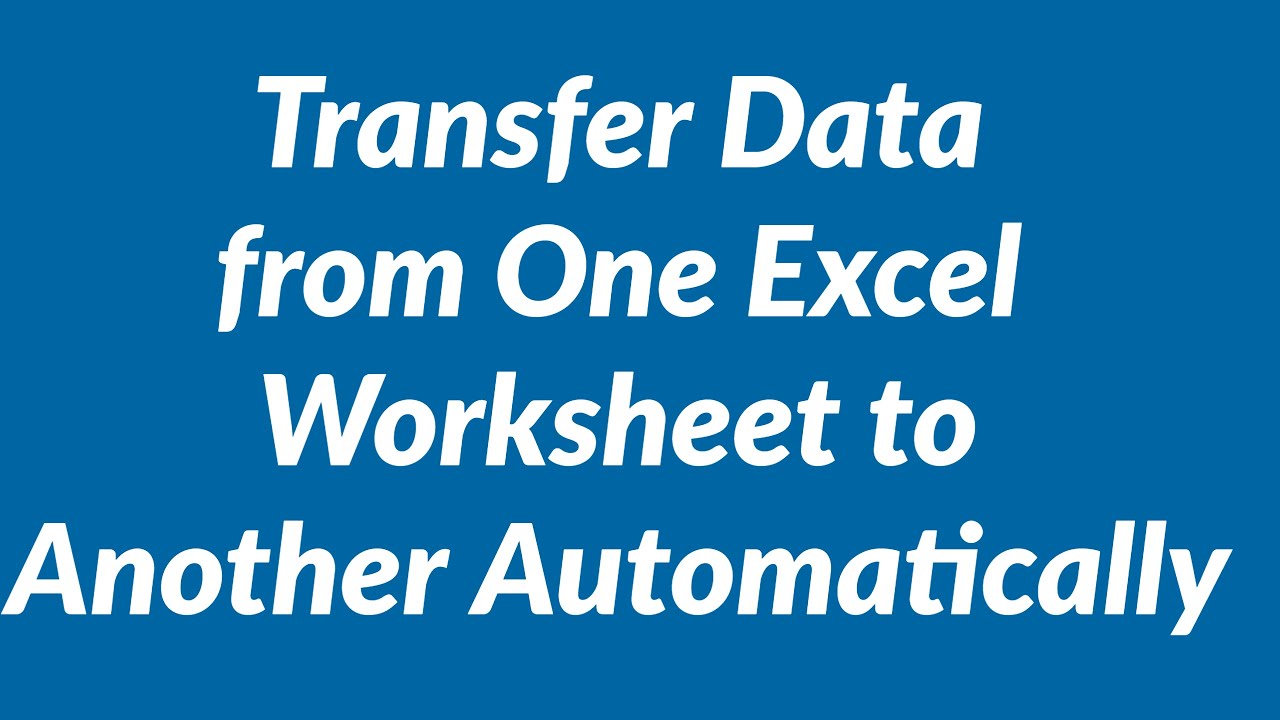5 Simple Steps to Transfer Excel Sheet Data

Data migration is an essential skill for anyone working with spreadsheets. Excel, being one of the most widely used tools for data manipulation, offers various methods to transfer data between sheets. Whether you need to consolidate data from different sources or simply want to reorganize your workbook, understanding how to transfer data efficiently can save time and reduce errors. In this guide, we'll explore five straightforward steps to transfer Excel sheet data, ensuring your work remains organized and your data intact.
Step 1: Identify Source and Destination Sheets

The first step in transferring data within an Excel workbook is to pinpoint the source sheet where your data currently resides and the destination sheet where you want to move it. Here’s how you can do it:
- Open your Excel workbook and locate the source sheet from which you need to transfer the data.
- Identify or create the destination sheet where you want to paste the data.
Step 2: Select the Data

Once you know which data you want to move, selecting it accurately is crucial:
- Click and drag to highlight the cells, rows, or columns you want to transfer. If you’re selecting an entire column or row, simply click the column or row header.
- Use
Ctrl+Con Windows orCommand+Con Mac to copy the selection.
Step 3: Transfer the Data

After selecting and copying the data, navigate to your destination sheet:
- Click on the destination sheet tab.
- Click into the cell where you want the top-left corner of your copied data to start.
- Press
Ctrl+Von Windows orCommand+Von Mac to paste the data.
📌 Note: When transferring data, formulas might not work correctly if the referenced cells are in a different workbook or if the relative cell references are not adjusted properly.
Step 4: Adjust and Organize

Once you’ve pasted the data, ensure everything is where it should be:
- Check if the formatting matches your expectations. Excel often pastes formatting along with data, but you can choose Paste Special to control what gets pasted (e.g., values only, formulas, or formats).
- If necessary, adjust column widths, update formulas, and ensure headers align with your new structure.
Here’s a quick guide on how to use Paste Special:
| Action | Shortcut (Windows) | Shortcut (Mac) |
|---|---|---|
| Open Paste Special | Alt + E + S | Option + Shift + Command + V |
| Paste Values Only | Alt + E + S + V + Enter | Option + Shift + Command + V then select “Values” |
| Paste Formats Only | Alt + E + S + T + Enter | Option + Shift + Command + V then select “Formats” |

Step 5: Review and Finalize

It’s important to review the data after transferring it to ensure accuracy:
- Check for any data discrepancies or misplaced columns or rows.
- Ensure that all necessary links and formulas are updated if you’ve transferred data between workbooks or different sections of a workbook.
- Verify that the data type matches what you expect; sometimes numeric data can be copied as text.
By following these steps, you've successfully transferred data from one Excel sheet to another. However, the key to efficient data management lies not just in transferring data but in maintaining the integrity of your datasets. Keep your work clean and organized, use functions like VLOOKUP or INDEX-MATCH for data retrieval, and consider using named ranges to make formulas easier to manage.
What are the alternatives to manual data transfer in Excel?

+
If manual transfer is not feasible due to large data sets, consider using Excel's Power Query to automate data import and transformation. Macros (VBA scripts) can also automate repetitive tasks, or you could leverage third-party software designed for data integration and management.
Can I transfer data between different versions of Excel?

+
Yes, but compatibility issues can arise, particularly with Excel's older versions which might not support newer file formats or functions. Always save or open files in a compatible format, like .xlsx for recent Excel versions.
How do I prevent data from being altered when transferring?

+
Always use "Paste Special" and choose "Values" if you only want the data values transferred without formulas or formats. For additional control, protect your sheets or range of cells to prevent unintended edits.
In conclusion, moving data between Excel sheets, whether in the same workbook or across different files, involves careful planning and execution. Following these steps ensures your data is organized, accurate, and ready for further analysis or reporting. Remember, efficient data management in Excel involves not only transferring data but also maintaining its integrity and ensuring it serves your analytical needs effectively.